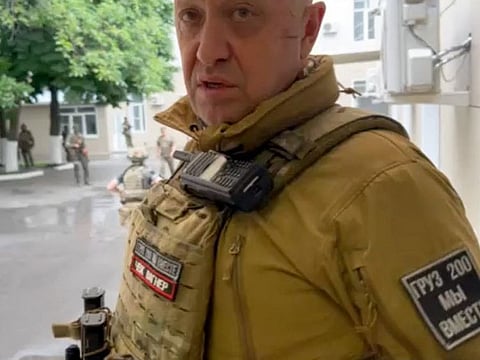Who is mercenary group Wagner boss Yevgeny Prigozhin calling for armed rebellion in Russia?
In January, Prigozhin acknowledged founding, leading and financing the company

Dubai: With aggressive PR, foul language and a frequent presence near the front lines, the shaven-headed Yevgeny Prigozhin is one of the most visible faces of the war, having recruited thousands of Russian prisoners to fight for Wagner and feuded openly with the defence ministry over military plans and ammunition supplies.
Prigozhin, 62, has for decades been known as "Putin's chef" due to his company's Kremlin catering contracts. It's unclear how friendly he and Russian President Vladimir Putin are, but they know each other and both men were born and raised in St Petersburg.
He received his first criminal conviction in 1979, aged just 18, and got a suspended two-and-a-half year sentence for theft. Two years later, he was sentenced to 13 years in jail for robbery and theft, nine of which he served behind bars.
Following his release, he opened a restaurant business in St. Petersburg in the 1990s. It was in this capacity that he got to know now-President Vladimir Putin, then the city’s deputy mayor.
Prigozhin used that connection to develop a catering business and won lucrative Russian government contracts.
He is the owner of a number of restaurants and catering companies, including Concord Catering, which has won billions of dollars in government contracts.
In the early 2000s, he began to win government contracts to feed school children and government workers. He also became a close associate of Putin, who was then the mayor of St. Petersburg.
In January, Prigozhin acknowledged founding, leading and financing the Wagner company.
Prigozhin was born in Leningrad (now St. Petersburg) in 1961. He had a difficult childhood, spending time in a children’s home and then in a juvenile detention centre.
Where has wagner operated?
In 2014, Prigozhin is believed to have founded the Wagner Group, a private military contractor that has been involved in conflicts in Syria, Libya, and Ukraine.
Prigozhin has been sanctioned by the United States and the European Union for his activities. He is currently under investigation by the US Department of Justice for possible criminal charges.
Wagner was first seen in action in eastern Ukraine soon after a separatist conflict erupted there in April 2014, in the weeks following Russia’s annexation of Ukraine’s Crimean Peninsula.
Prigozhin’s company was called Wagner after the nickname of its first commander, Dmitry Utkin, a retired lieutenant colonel of the Russian military’s special forces.
It soon established a reputation for brutality and ruthlessness.
Prigozhin has reportedly used Wagner’s deployment to Syria and African countries to secure lucrative mining contracts.
US Undersecretary of State Victoria Nuland said in January the company was using its access to gold and other resources in Africa to fund operations in Ukraine.
Some Russian media alleged that Wagner was involved in the 2018 killings of three Russian journalists in Central African Republic who were investigating the group’s activities. The slayings remain unsolved.
What just happened?
Russia’s Federal Security Service has announced a criminal case against Prigozhin, accusing him of “incitement to armed rebellion” after he declared an open conflict with Russia’s military leadership and called on Russians to join 25,000 Wagner fighters against Defence Minister Sergei Shoigu and other top commanders.
At least one senior general, Vladimir Alekseyev, the deputy head of Russia’s military intelligence, accused Prigozhin of attempting a “state coup” but there was no evidence of an attempted overthrow of the government.
Kremlin spokesman Dmitry Peskov said that President Vladimir Putin had been informed about the situation and that “all necessary measures” were being taken.
The announcement of the criminal case by the Federal Security Service, or FSB, signalled that Prigozhin could face imminent arrest for comments in which he declared that he would lead a “march of justice” against his enemies in Russia’s Ministry of Defence. The Wagner leader denied that he was attempting a military coup.
What’s behind all this?
Prigozhin has been in a running, months-long feud with Shoigu and other regular military commanders, including over complaints that Wagner fighters were denied sufficient ammunition. But Prigozhin’s comments late Friday amounted to an extraordinary, hostile challenge to Russian military authorities, and suggested that the dispute was on the brink of spilling into open warfare.
In a series of furious audio messages, Prigozhin accused Shoigu of flying to Rostov in southern Russia specifically to launch a missile strike against Wagner, before fleeing the area late Friday.
The Russian Defence Ministry responded swiftly to Prigozhin’s threats, denying his claim that the military had struck a Wagner camp, calling it “an informational provocation.”
“The armed forces of the Russian Federation continue to carry out combat missions on the line of contact with the armed forces of Ukraine in the area of the special military operation,” the ministry said.
In a bid to resolve the crisis, senior Russian general Sergei Surovikin, deputy commander of the Russian forces in Ukraine, who reportedly has good relations with Prigozhin, called on him to halt his threatened action.
“I urge you to stop. The enemy is just waiting for the internal political situation to worsen in our country,” Surovikin said, warning Prigozhin not to play into the hands of the enemy.
“Before it is too late, it is necessary to obey the will and order of the popularly elected president,” Surovikin said in a video. “Stop the columns. Return them to the points of permanent deployment. Solve all problems only by peaceful means under the leadership of the Supreme Commander-in-Chief.
Sign up for the Daily Briefing
Get the latest news and updates straight to your inbox



